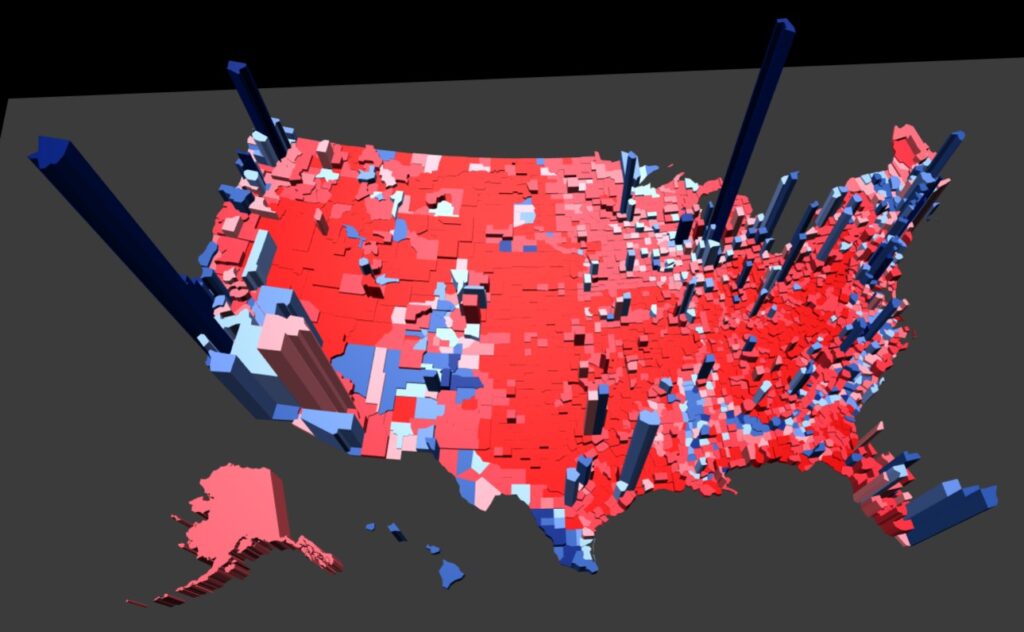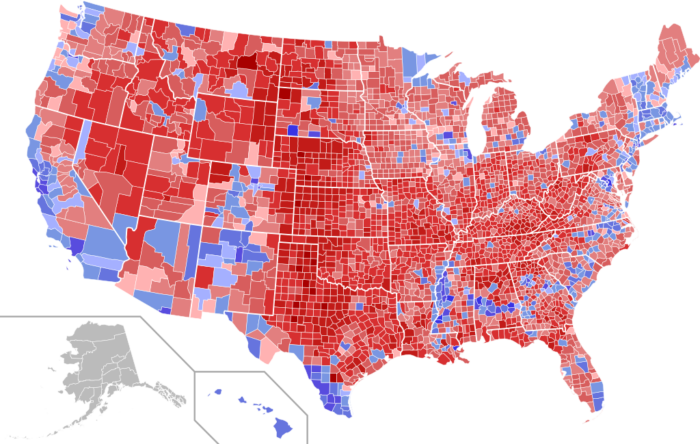เนื่องจากยังนับคะแนนไม่เสร็จ ขอใช้แผนที่ปี 2016 แทน ซึ่งก็ไม่ต่างกันมาก
เขียนบล็อกนี้ตอนที่ผลการเลือกตั้งประธานาธิบดีสหรัฐยังไม่ออก แต่สิ่งที่เรารู้แน่ๆ คือ อเมริกายังแตกแยกออกเป็น 2 ส่วนเท่าๆ กันเหมือนเดิม
ถ้าเราพักเรื่องคะแนนแบบ electoral college เอาไว้ก่อน ดูกันที่คะแนน popular vote ล้วนๆ ณ ตอนที่เขียนคือ
- 2020: Biden 71.3M (50.4%) vs Trump 67.8M (47.9%)
ปรากฏการณ์นี้ไม่ใช่สิ่งที่เพิ่งเกิดขึ้น เพราะมันเกิดขึ้นมาตั้งแต่การเลือกตั้งปี 2000 แล้ว
- 2016: Clinton 65.8M (48.2%) vs Trump 62.9M (46.1%)
- 2012: Obama 65.9M (51.1%) vs Romney 60.9M (47.2%)
- 2008: Obama 69.4M (52.9%) vs McCain 59.9M (45.7%)
- 2004: Kerry 59M (48.3%) vs Bush 62M (50.7%)
- 2000: Gore 50.9M (48.4%) vs Bush 50.4M (47.9%)
ถ้าไม่นับกรณีของปี 2008 ที่ Obama ทิ้งขาดที่ประมาณ 10 ล้านเสียง (เพราะพลัง change factor) จะเห็นว่าสองปีกการเมืองของสหรัฐมีฐานเสียง “พอๆ กัน” มาโดยตลอด ตรงนี้ไม่ได้มีผลแต่การเลือกตั้งประธานาธิบดีเท่านั้น ยังส่งผลไปถึงสภาสูงและสภาล่าง ที่มีเสียงปริ่มน้ำพลิกกันไปมาตลอดเช่นกัน
การเลือกตั้งที่ฉิวเฉียดที่สุดในประวัติศาสตร์อเมริกาคือ ปี 2000 ที่ต้องวัดคะแนน electoral vote กันในรัฐสุดท้ายคือ Florida ซึ่ง Bush ชนะไปเพียง 537 คะแนน (และมีดราม่าเรื่องนับคะแนนใหม่ด้วย) เหตุการณ์ครั้งนั้นก็ทำให้อเมริกาแตกแยกพอสมควร มีคนอยากย้ายไปอยู่แคนาดากันเยอะ
แต่ความแตกต่างทางการเมืองสองขั้วในปี 2000 ยังไม่รุนแรงเท่ากับในยุคนี้ ทั้งสองฝ่ายยังอยู่ร่วมกันต่อมาได้ และ Bush ก็มีเหตุการณ์ 9/11 เข้ามาช่วย “รวมใจ” คนในชาติให้เป็นหนึ่งได้หลังจากเลือกตั้งไม่ถึงปี
ความแตกแยกของปี 2020 ยิ่งเด่นชัด เมื่อเราดูตัวเลขผู้มาใช้สิทธิ (voter turnout) ที่สูงสุดเป็นประวัติการณ์ในรอบ 120 ปี โดยตัวเลขที่เพิ่มขึ้นมาจากผู้ใช้สิทธิทั้งสองพรรค
ตอนนี้ยังนับคะแนนไม่เสร็จ แต่ตัวเลขคะแนนดิบของ Biden สูงสุดในประวัติศาสตร์ไปแล้ว ส่วน Trump ก็สูงสุดในฝั่งรีพับลิกัน และสูงสุดเป็นอันดับสามในประวัติศาสตร์ (อันดับสองคือ Obama ปี 2008)
กลับมาที่ปี 2020 ไม่ว่าใครจะชนะเลือกตั้งได้เป็นประธานาธิบดีก็ตาม สิ่งที่ไม่เปลี่ยนแปลงแน่ๆ คืออเมริกายังแตกแยกทางความคิดต่อไป และประธานาธิบดีคนใหม่จะทำงานยาก เพราะข้อจำกัดเรื่องเสียงในสภา จึงไม่สามารถขับเคลื่อนนโยบายสำคัญๆ ได้ง่ายนัก (ดังที่ Obama เคยเจอมาแล้วกับ Obamacare)
การทำงานยากในห้วงเวลาปกติก็อาจไม่เท่าไร แต่ในภาวะที่ประเทศเจอปัญหา COVID และวิกฤตเศรษฐกิจ มันยิ่งเป็นปัญหาสำคัญที่ทำให้ประเทศไม่เดินหน้าไป และส่งผลให้อเมริกาอ่อนแอลงอีกมากในระยะยาว
มีสื่ออเมริกันหลายแห่ง เล่นประเด็นนี้
Foreign Policy บอกว่านี่เป็น worst-case scenario และทำให้รัฐบาลเป็นง่อย กลายเป็นว่าการขับเคลื่อนเศรษฐกิจจะเป็นหน้าที่ของธนาคารกลาง (Fed) เพียงอย่างเดียว
This is the worst-case scenario. The most likely result is divided control of the White House and Congress (with Republicans maintaining control of the Senate), paralysis in fiscal policy, and continued reliance on the Fed as the main backstop not just of the U.S. economy but of the entire global economy.
ส่วน New York Times พูดว่า การเลือกตั้งครั้งนี้คือการเลือกวิสัยทัศน์ว่าอเมริกาในยุคถัดไปจะเป็นอย่างไร ซึ่งแนวทางของทั้งสองฝ่ายแตกต่างกัน ผลที่เกิดขึ้นกลับเป็นทางออกแบบที่ 3 อเมริกาที่ไม่เชื่อใจกันและกัน สถาบันต่างๆ ในชาติไม่ฟังก์ชันอย่างที่ควรจะเป็น
On Tuesday, this abiding conflict — over which vision of America will endure, over whether this president is more protector or destroyer
America is now a nation where businesses in many cities boarded up their windows in anticipation of election violence. It is a nation where partisans daydream about seeing their political opponents in jail and where the sitting president has pressed his own Justice Department to follow through. It is a nation where Black Lives Matter protesters have pressed their cause in the streets and where caravans of Trump backers have filled highways and waterways with a procession of MAGA flags.
It is a nation where faith in institutions, already dismal, was not helped by a year in which federal authorities could not safeguard their own people against a deadly disease.
สำนักข่าว ABC ของออสเตรเลีย บอกว่าเรื่องนี้ไม่ใช่ประเด็นใหม่ แต่แสดงให้เห็นว่าข้อเสนอ “สมานฉันท์” ของ Biden ไม่ได้รับการตอบรับอย่างที่คิดไว้
America is divided. So what’s new?
For all of Joe Biden’s claim that there are no blue states and red states, it was always nonsense and the election has proved that yet again.
Biden’s pitch for unity has not moved the dial. Even if he goes on to win the presidency — and he’s confident of that — he will govern that which in recent times refuses to be governed.
ส่วน Wall Street Journal ชี้ว่าความแตกต่างของเมือง “สองนคราประชาธิปไตย” ที่เกิดขึ้นในปี 2016 ก็ยังเป็นเหมือนเดิม คนเมืองใหญ่เลือกเดโมแครต คนชนบทเลือกรีพับลิกัน
ความแตกแยกของอเมริการ้าวลึกในระดับที่ว่า มีภัยพิบัติครั้งใหญ่แบบ COVID ยังไม่ส่งผลให้สถานการณ์ความแตกแยกเปลี่ยนแปลง
In sum, the most bitter presidential campaign in memory, conducted against the backdrop of a pandemic and summer of racial reckoning, seems not to have altered the fundamental contours of the American body politic. There have been changes in the margins, to be sure, but the massive turnout seen in this year’s voting seems to have only confirmed with greater intensity how deep the divides run.
But at its heart, the 2020 race was more about cultural issues and attitudes: Should the country worry more about public health or economic health? Should a summer of social unrest leave Americans worrying more about systemic racism or a breakdown of law and order? Is the country’s growing diversity a strength to relish or a hurdle to overcome?
At first blush, it doesn’t appear the election showed a consensus emerged on any of those questions. Instead, the debate over all of them seems destined to carry on.
In many places, the election confirmed, red America is growing more red and blue America more blue.
เมื่อพูดเรื่องความแตกแยกแบบ “สองนครา” ของอเมริกา ระหว่างไปค้นหาแผนที่การเลือกตั้งปี 2016 ก็เจอแผนที่แบบ 3D อันนี้ ที่คิดว่าแสดงดีกรีความแตกแยกของอเมริกาได้อย่างเห็นภาพมาก เพราะปกติแล้วแผนที่เลือกตั้งจะแสดงเป็นสีเข้ม-อ่อน (น้ำเงินเข้ม น้ำเงินอ่อน แดงอ่อน แดงเข้ม) ที่แยกระดับปริมาณได้ยาก แต่แผนที่อันนี้แสดงให้เห็น “ความสูง” ที่ชัดเจนมาก

สองนคราของอเมริกา แยกเป็นเมืองใหญ่ที่สัมผัสกับโลกเยอะกว่า และเมืองเล็กที่อยู่กันเองเฉพาะในประเทศ ความแตกต่างแตกแยกยิ่งแจ่มชัด ก็เป็นสิ่งที่ประธานาธิบดีคนใหม่ต้องถามตัวเอง (รึเปล่า?) ว่าเราจะอยู่กันต่อไปอย่างไร




